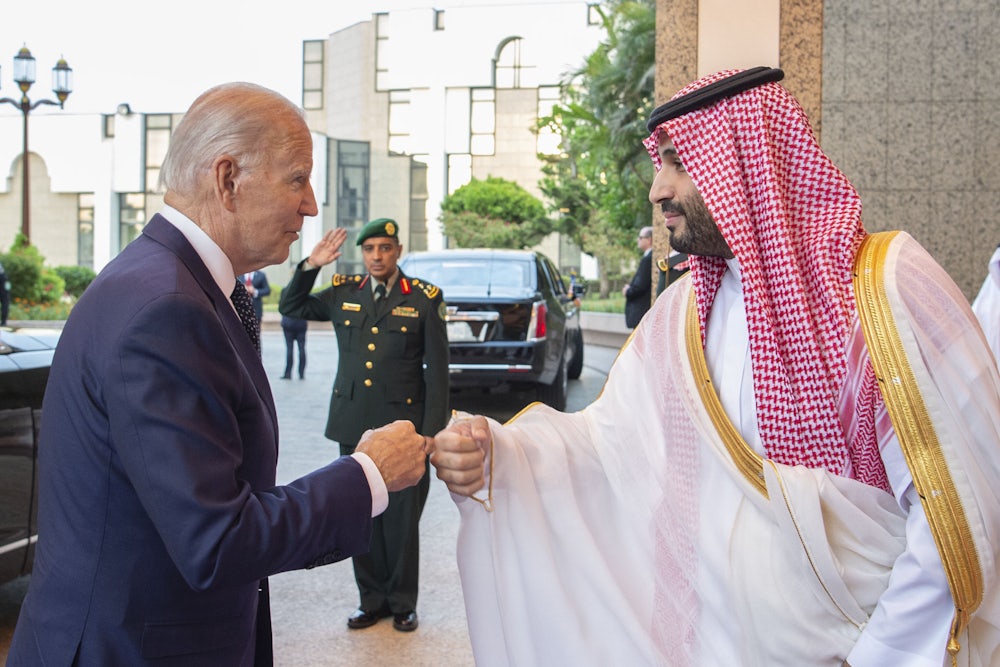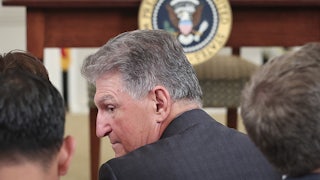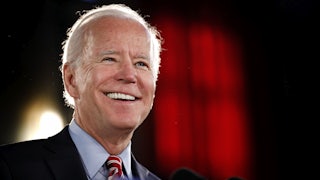Speaking to reporters after meeting with Saudi Arabia’s Crown Prince Mohammed bin Salman—a man who the U.S. government concluded ordered the murder of a Washington Post columnist and who is currently overseeing a brutal war in Yemen—President Joe Biden made the case that he was there to assert control over a situation that had grown chaotic, not to embrace a despot.
“I didn’t come here to meet with the crown prince,” Biden said from Jeddah last week. “I came here to meet with the [Gulf Cooperation Council] and nine nations to deal with the security and the needs of the free world, and particularly the United States, and not leave a vacuum here, which was happening as it has in other parts of the world.”
Embracing foreign policy as an attempt to jump-start a presidency mired in domestic discord is practically a cliché at this point—Richard Nixon, Bill Clinton, and Donald Trump have all done it. For Biden, who spent years chairing the Senate Foreign Relations Committee, foreign policy is a source of comfort. In recent months, as his poll numbers have cratered among concerns about inflation, the economy, and his leadership, foreign policy has also been arguably the one bright spot of his presidency: His handling of Russia’s invasion of Ukraine has been assertive but not too aggressive; he has managed to, with the help of European allies, support Ukraine and expand NATO without expanding the conflict.
But Biden’s trip to the Middle East was also desperate and built on a gamble. With inflation and high gas prices at home, Biden was making a bet that he could play one of the few cards he had left—welcoming bin Salman back into the international community—in exchange for short- and long-term benefits. It didn’t pay off.
There is an argument that it may yield some productive results in the long run. The biggest accomplishment of the trip—if you can call it that—was the work done to bring Saudi Arabia and Israel closer together. As Politico’s Alexander Ward and Jonathan Lemire wrote, Biden garnered “historic agreements to bring Jerusalem and Riyadh closer together, a crown prince seemingly more open to ending the war in Yemen and a renewed push to solve the intractable conflict between Israelis and Palestinians.” There are a lot of ifs here, however. Israel’s current prime minister, Yair Lapid, is more of a seat-filler; elections will be held soon, and his party may very well lose. Bin Salman may have expressed openness about ending the war in Yemen, but Saudi Arabia is also the primary aggressor of that conflict, and this isn’t exactly the first time it has declared it will end the war.
As for a renewed push to solve the Israeli-Palestinian conflict, well, good luck with that. Biden made no mention of the murder of Palestinian-American journalist Shireen Abu Akleh during his visit; little mention was made of the death of Jamal Khashoggi. Meanwhile, the Israeli government used Biden’s visit as an excuse to label a number of Palestinian rights groups as “terrorist” organizations.
At the same time, efforts to revive the Iran nuclear deal have sputtered, and Biden’s visit to Israel and Saudi Arabia likely didn’t help matters. “I think the process is increasingly hopeless,” Ali Vaez, the Iran Project director at the International Crisis Group, told ABC. “The meeting in Doha was a major setback, because it was an absolute dead end,” he added, referring to the ninth round of talks on the nuclear deal last month. The Biden administration’s special envoy to Tehran admitted on Monday—ahead of Vladimir Putin’s visit to Iran—that chances of restarting the deal were diminishing “by the day.”
The biggest reason for Biden’s trip to the Middle East was to pressure, or perhaps beg, bin Salman to increase oil production. But OPEC, the oil cartel dominated by Saudi Arabia, has shown little indication that it will, or interest in doing so. Seen in one light, the trip was Biden playing his last card. Having failed at everything else, he had no choice but to embrace bin Salman in the hopes that he would, in turn, do Biden a favor.
Of course, Biden didn’t embrace bin Salman per se—he fist-bumped him, an act that surely was the result of a great deal of debate among White House aides. (It is less intimate than a hug or a handshake, but more intimate than a pat on the back.) But that fist bump also signaled that the administration’s half-hearted effort to freeze out bin Salman over his numerous human rights violations was over; relations between the U.S. and Saudi Arabia had normalized. What credibility Biden had built up on human rights and foreign policy was instantly diminished. If he needed something bad enough—in this case, lower gas prices—then anything can be forgiven.
For Biden, this also points to a political problem. Facing a series of related domestic crises, he had hoped that a trip abroad would fix arguably his most glaring political problem: the high cost of gas. But at the very least, there was hope that it would reassert his status as a leader, something that has taken a hit amid the administration’s near silence in the wake of the overturning of Roe v. Wade and the constitutional right to abortion. But the most prominent image of his trip isn’t the celebration of a new alliance or a deal to increase gas production: It’s a fist bump with a man who the U.S. government found ordered the assassination of a journalist who had been living in America.






